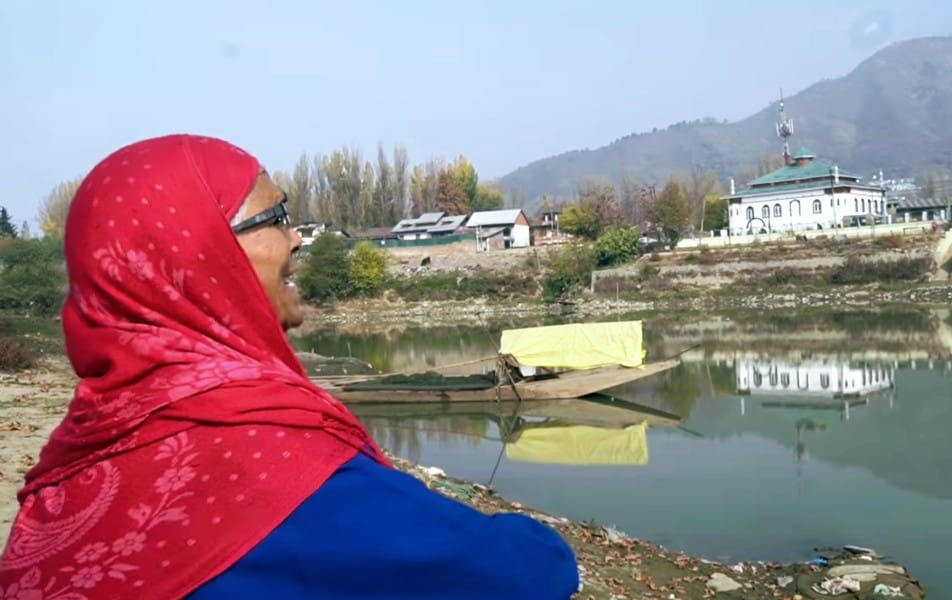
Shabir Ali
It has been 218 days since the tragic capsizing of a boat in the swollen waters of the Jhelum River claimed the life of 38-year-old Showkat Ahmad Sheikh, leaving his family in anguish.
Today, as the river runs almost dry and the water levels have receded, the memories of that fateful day remain frozen in time for Saja Begum, his grieving mother.
Every day since April, Saja Begum has returned to the riverbank, her frail figure silhouetted against the now-placid waters.
With tears streaming down her face, she pleads with the river to return her son’s body. “The river has given me nothing but sorrow. Every morning, I come here hoping it will show mercy and give back my son,” she whispers, clutching a fading photo of Showkat.
For Saja, the river is no longer a source of life but a haunting reminder of her irreparable loss.
“Only for a few days did they search for my son. But after that, nobody even tried to find the hero who drowned while saving lives,” she laments. “Now, it’s just me—alone—looking for him every day.”
“Only for a few days, they searched for my son,” she laments, her voice weary with grief and frustration.
“But after that, nobody has even tried to find the hero who drowned while saving the lives of others. Now, it’s just me who comes looking for him every day at the river.”
The tragedy unfolded on a rainy April morning when a wooden boat, ferrying 19 people, including nine schoolchildren, was swept away by the raging waters of the Jhelum.
Six persons including Firdousa Akhtar, her twin children Mudasir and Tanveer, and several others, while Showkat remains missing to this day.
Showkat, a mason and father, had been accompanying his young son, Haziq, to school that fateful day.
Despite the rising waters, the two boarded the ill-fated boat, unaware it would mark their final journey together.
“Showkat was among those who tried to calm the panicked passengers as the boat swayed violently, witnesses later recalled. Despite the chaos, his focus remained on protecting his son, Haziq, clinging tightly to him even as the currents overpowered them,” his mother said.
Showkat’s wife recalls his bravery during the 2014 floods, a time when the Jhelum had transformed into a river of despair for thousands of Kashmiris.
“He saved the lives of hundreds, ferrying them across angry waters. He was fearless, determined to help others even in the direst circumstances,” she said, her voice breaking.
Yet, this courage has gone unacknowledged. For Saja, the anguish of her son’s disappearance is compounded by the lack of sustained efforts to recover his body.
“He is a hero, but they have abandoned him,” she said, her grief laced with quiet bitterness.
The tragedy at Gandabal sparked outrage across Kashmir, highlighting years of administrative neglect.
Political parties demanded an investigation into the delayed construction of the Gandabal bridge, which had dragged on for over a decade.
Months later, the bridge stands completed—a structure that should symbolize progress but, for Showkat’s family, is a haunting reminder of loss.
“The bridge was certainly important, but for me, it holds no value. It is a constant reminder of my missing husband,” said Showkat’s wife, her words heavy with the weight of unhealed wounds.
The River’s Unforgiving Silence
Months after the incident, the Jhelum flows on, indifferent to the pain it has caused. Rescue operations ceased weeks after the tragedy, leaving families like Saja’s in limbo.
“I just want to find him,” Saja whispered, her voice almost inaudible over the sound of the river. “I need a place to mourn him, to lay him to rest. Is that too much to ask?”
In Kashmir, a land marked by resilience and sorrow, the Jhelum holds its secrets tightly. For Saja, every passing day brings the faintest glimmer of hope—but also the deepening weight of despair.




